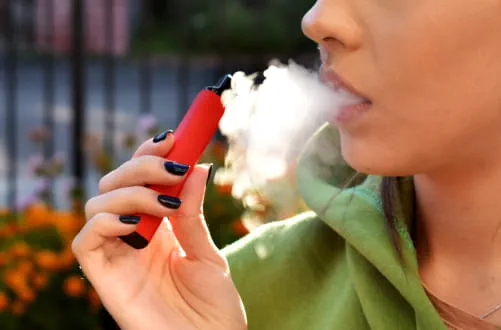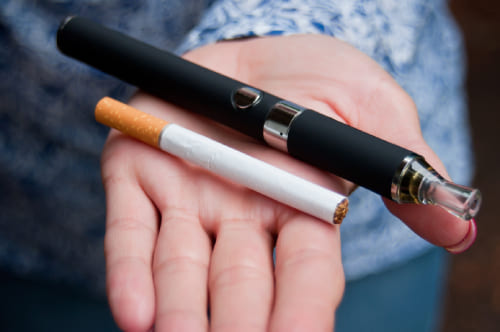
Is vaping bad for your teeth?
Vaping, or the use of e-cigarettes, is frequently promoted as a safer alternative to smoking tobacco, which may explain vaping’s significantly increased popularity in the past couple of years. However, this is a cause of some real concern. There are so many vaping products and ingredients on the market today, that medical professionals are struggling to understand or predict what the long-term effects might be.
Indeed, government statistics suggest that the number of people vaping more than doubled from 4% to 8.6% between 2021 and 2022,1 despite developing claims within the medical community regarding its impact on oral and overall health. Worryingly, children are quickly picking up the habit, too. A 2023 survey by YouGov found that 7.6% of 11 - 17 year olds in the UK regularly use e-cigarettes, up from 6.9% in 2022.2
Vaping is the inhalation of nicotine via flavoured water vapour. Vape liquids vary in nicotine strength, and some contain no nicotine at all. However, those who vape for either recreational purposes or as a method by which to reduce or quit smoking altogether are frequently asking: is vaping bad for your oral health?
With no shortage of conflicting information out there surrounding the potential negative impact of vaping, it’s time to cut through the noise, consider the latest research, and take a closer look at how e-cigarette use may be harming your dental health.
Does vaping stain your teeth?
The impact of traditional cigarettes and tobacco smoking on the teeth is well understood. Cigarettes and cigars contain relatively high levels of tar. The tar can quickly result in tooth discoloration. While vaping removes the presence of tar from the equation, the artificial flavourings and the sticky aerosol in vape liquids can also worsen the appearance of your teeth as they trap stains in the enamel. The staining of both teeth and tooth-coloured fillings can occur from vapes with no nicotine content as much as those with nicotine.

How does vaping affect your oral health?
Our teeth and gums, just like every part of our body, thrive on a delicately-balanced system which can be affected by the introduction of harmful chemicals. It is true that e-cigarettes feature a smaller array of potentially harmful chemicals and trace elements than found in tobacco. Despite this, they still include several ingredients which have been recognised as damaging to our oral and general health.
When you vape, you’re not simply introducing nicotine into your body, which is addictive and is therefore hard to break the habit. But the vegetable glycerin and propylene glycol also present in vape liquids (among several other chemical additives) create a sticky, viscous substance that changes the bacterial makeup of your mouth. This can lead to:
While vaping is widely agreed to be safer than smoking, medical professionals are concerned that instead of using vaping devices as a ‘stop smoking’ method, never-smokers are taking up vaping as a lifestyle choice and this may have wider health implications than just the oral ones described.
Can dentists tell if you vape?
As we’ve seen, the effects on the mouth, teeth and gums caused by vaping are detectable. As such, your dentist will be able to spot the impact of vaping during your check-up, especially if you’ve been vaping for a long time. But please don’t hide that you are vaping- this is important so your dentist/hygienist can check your mouth fully and advise on oral care.
If you would like to receive support on quitting smoking or vaping, there is plenty of help and assistance available through your health service provider.

Smoking vs vaping: which is worse for your oral health?
While it is widely reported that vaping is a safer alternative to smoking tobacco, both can cause oral health problems. From tooth discolouration to an increased build-up of plaque, and from inhibited saliva production to a heightened risk of gum disease, cavities, tooth loss and more, the changes to the mouth’s bacterial biome that vaping causes can create a wide array of issues.
There’s an additional important factor to keep in mind, too: the impact of vaping on your oral health is yet to be fully understood. Independent research and a broad range of studies into the effects of vaping are currently underway, meaning key insights into the damage caused by vaping are yet to be revealed.
While 38% of Britons think smoking cigarettes is worse for your health than vaping3, e-cigarettes and vapes simply haven't been around for long enough for medical professionals to fully assess the risks. However, the risks which have already been established paint a worrying picture for those keen to maintain their oral health.
Reducing the impact of vaping on your oral health
There are several things that you can do to reduce the impact of vaping on your teeth, gums and overall oral health. These include:
Sources: 1Gov.uk 2YouGov Survey for ASH 2023 3YouGov Survey 2024


